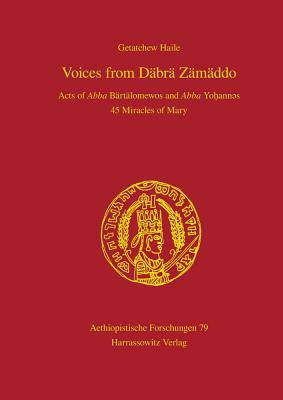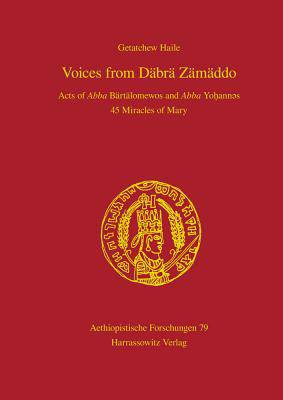
- Afhalen na 1 uur in een winkel met voorraad
- Gratis thuislevering in België vanaf € 30
- Ruim aanbod met 7 miljoen producten
- Afhalen na 1 uur in een winkel met voorraad
- Gratis thuislevering in België vanaf € 30
- Ruim aanbod met 7 miljoen producten
Zoeken
Voices from Dabra Zamaddo
Acts of Abba Bartalomewos and Abba Yohannes 45 Miracles of Mary
Getatchew Haile
Hardcover | Engels
€ 145,45
+ 290 punten
Omschrijving
Voices from Dabra Zamaddo" presents three major sources on the history of the Ethiopian Orthodox Church and its monasticism: two hagiographical histories (gadlat), one of Abba Bartalomewos and one of Abba Yohannes, founders of the famous monastery in Lasta, Wallo, and a collection of forty-five miracles of Mary worked in Dabra Zamaddu and the surrounding region. The sources testify to the monastery's spiritual impact on the local population and to its share of the sufferings inflicted by the sixteenth-century revolt and invasion of the Islamic forces of Iman Ahmad from the east, and by the overwhelming Oromo migration from the south. As narrated in the gadlat, the story of how the monastery's manuscripts escaped these devastations despite a lack of protection is a miracle indeed. A number of the miracles of Mary contained here can be traced to other sources or are repeat miracles told in the two gadlat. The majority, however, are unique and of high historical value. Only these miracles contain, for example, the information that the region around the monastery was in total darkness for days due to extraordinarily severe weather during that time. The sources are edited, translated, and commented upon by Getatchew Haile, who has relied on his decades long study of Ge'ez and Amharic manuscripts and the resulting expertise to supply the translations with the necessary annotations.
Specificaties
Betrokkenen
- Auteur(s):
- Uitgeverij:
Inhoud
- Aantal bladzijden:
- 273
- Taal:
- Engels
Eigenschappen
- Productcode (EAN):
- 9783447100687
- Verschijningsdatum:
- 1/12/2013
- Uitvoering:
- Hardcover
- Formaat:
- Genaaid
- Afmetingen:
- 170 mm x 239 mm
- Gewicht:
- 679 g

Alleen bij Standaard Boekhandel
+ 290 punten op je klantenkaart van Standaard Boekhandel
Beoordelingen
We publiceren alleen reviews die voldoen aan de voorwaarden voor reviews. Bekijk onze voorwaarden voor reviews.







